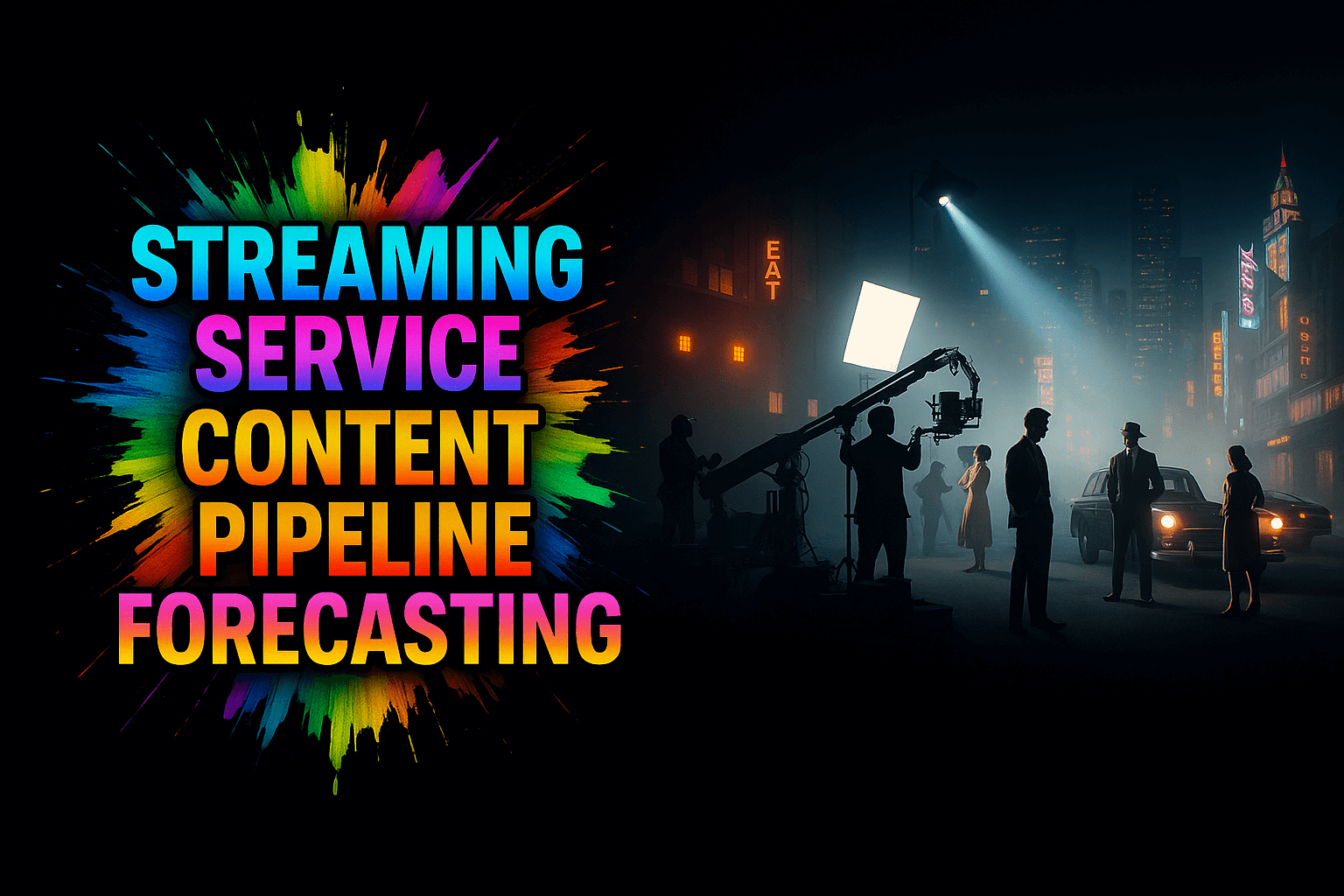The Strategic Imperative of Streaming Service Content Pipeline Forecasting

Introduction
In the hyper-competitive world of streaming, content is both the primary product and the single largest cost center. Executives are constantly challenged to make multi-million-dollar decisions on content acquisition and original production without complete visibility into the future.
The traditional approach—relying on a mix of trade announcements, agent pitches, and gut instinct—is a reactive model that leads to misaligned programming, costly licensing misfires, and a failure to proactively fill content gaps.
The strategic solution is a paradigm shift toward streaming service content pipeline forecasting. This practice is not simply about predicting a single title’s success.
It is a comprehensive, data-driven approach that provides a continuous, forward-looking view of the entire content slate. It enables executives to understand not just what content is available, but also what the market is creating, who the key collaborators are, and how that content aligns with strategic programming goals.
This is the new imperative: to move beyond reactive acquisition and into a state of proactive, intelligent pipeline management.
Vitrina’s role is to provide the technology that makes this strategic shift possible. The platform aggregates, verifies, and connects millions of data points from the global entertainment supply chain, empowering M&E professionals to execute a new, more intelligent approach to content acquisition and programming strategy.
Table of content
- The Unseen Challenge: The Problem with Reactive Content Acquisition
- What is Streaming Service Content Pipeline Forecasting?
- The Strategic Imperative for Streaming Executives
- The Role of Technology: A Look at the Vitrina Platform
- How Vitrina Transforms Forecasting into a Competitive Advantage
- Conclusion: The Future of the Streaming Pipeline Is Data-Driven
- Frequently Asked Questions
Key Takeaways
| Core Challenge | Reactive content acquisition for streaming services leads to misaligned slates and high-risk investments. |
| Strategic Solution | A data-driven, unified approach to forecasting the content pipeline. |
| Vitrina’s Role | The Vitrina platform provides the centralized intelligence required to execute this strategy. |
The Unseen Challenge: The Problem with Reactive Content Acquisition
The traditional approach to filling a streaming content slate is a reactive, ad hoc process. Executives attend film festivals, review agent pitches, and scan trade publications for a fragmented view of what’s available.
This leaves them constantly behind the curve. They often learn about a project when it is already in advanced production or, worse, after a competitor has secured the rights.
This lack of early visibility makes it impossible to proactively address strategic content gaps, such as a lack of sci-fi series for a target demographic or a shortage of family programming.
This results in costly licensing decisions, as platforms may overpay for titles to fill a last-minute void. The high cost of content, combined with this reactive model, makes it incredibly difficult to build a coherent programming slate that aligns with long-term business goals like subscriber acquisition and viewer retention.
The opaque nature of the entertainment supply chain means that while a sales team might use a CRM to track potential deals, they lack the foundational market intelligence on the projects themselves.
What is Streaming Service Content Pipeline Forecasting?
Streaming service content pipeline forecasting is a strategic discipline that uses data to predict and manage the future of a content slate. It goes far beyond simply analyzing past performance or viewer metrics.
This practice is based on the continuous monitoring of the global entertainment supply chain to identify and analyze projects long before they are released. The core components of this strategic approach are real-time project tracking, in-depth collaborator analysis, and proactive competitive intelligence.
A robust forecasting system enables a streamer to see which projects are entering development, what genres and budgets are trending, and which companies are actively producing. It provides a living map of the industry, linking projects to the key executives, financiers, and production companies behind them.
This is the difference between simply knowing a project exists and understanding its full context, which is essential for making a data-informed decision about its potential value to a content slate.
The Strategic Imperative for Streaming Executives
For senior leaders at streaming services, adopting a modern content pipeline forecasting strategy is no longer optional; it is a competitive necessity. For Programming and Content Strategy teams, this approach provides the intelligence needed to build a coherent and balanced slate that addresses audience demands and fills strategic content gaps.
They can identify emerging trends and proactively acquire or commission titles that will resonate with viewers. For Content Acquisition & Business Development leaders, it serves as a critical early warning system, allowing them to spot pre-buy opportunities for high-potential projects and to engage with partners at the earliest possible stage.
Finally, for Operations and Licensing teams, the ability to see a project’s full chain of collaborators—from the production company to the financiers and international distributors—significantly streamlines the due diligence and vetting process.
The Role of Technology: A Look at the Vitrina Platform
To execute a sophisticated streaming service content pipeline forecasting strategy, a technology platform built for the complexities of the global entertainment supply chain is required.
Vitrina is purpose-built to be that platform. It serves as a centralized, living database for the industry, offering a 360-degree view of the market. The platform’s Global Projects Tracker is a core feature that provides real-time updates on film and television projects at every stage of their lifecycle.
It automatically aggregates data from a vast network of global sources to provide unparalleled visibility. The platform’s ability to map relationships between projects, companies, and people is a key differentiator.
It connects a project to its key collaborators, providing a critical layer of context that allows users to see not just what is being made, but by whom and with what resources. Furthermore, Vitrina’s People Intelligence feature enables executives to identify and engage with the right contacts from a database of over 3 million professionals, eliminating the need for cold calls and guesswork.
How Vitrina Transforms Forecasting into a Competitive Advantage
By centralizing and structuring global entertainment data, Vitrina transforms content forecasting from a manual, reactive task into a strategic, proactive function. In the old model, a content acquisition executive might rely on a pitch deck or a trade article to learn about a new series.
The process to vet that project, research the team, and understand the market is a fragmented, slow, and often fruitless process. With Vitrina, this workflow is compressed and automated.
The executive can set alerts to be notified the moment a new project enters development with specific criteria. The platform instantly provides a detailed profile of the project, including its current stage, the companies attached, and a map of their past collaborations.
The executive can then use Vitrina’s intelligence to see which companies are producing in a given genre or country, identifying new opportunities and potential partners for co-production or licensing.
This dramatically accelerates the pace of business development and increases the probability of a successful deal. Vitrina also provides crucial insights for strategic planning, allowing executives to monitor the development slates of competitors, identify emerging trends in intellectual property (IP), and track production financing and co-production models across the globe.
You can learn more about how Vitrina’s solutions provide a competitive edge.Discover how Vitrina helps you find your competitive advantage.
Conclusion: The Future of the Streaming Pipeline Is Data-Driven
The streaming industry is at an inflection point. The traditional, analog methods of managing the content pipeline are no longer sufficient in a globalized, data-rich market. The future belongs to those who embrace a strategic, data-driven approach.
Streaming service content pipeline forecasting is the practice, and platforms like Vitrina are the enabling technology. By providing a centralized, continuously updated source of intelligence on projects, companies, and collaborators, it empowers M&E executives to move from a state of reactive discovery to one of proactive, data-informed opportunity capture. It is the essential strategic shift for anyone serious about staying ahead in the global entertainment business.
Frequently Asked Questions
Content forecasting involves analyzing historical data, industry trends, and market signals to predict future demand and performance. Modern methods use technology to track projects in development, analyze collaborator networks, and identify emerging trends.
Analyzing a content pipeline involves reviewing the status of all projects in development, production, and distribution. This requires a clear understanding of each project’s stage, budget, key collaborators, and potential market value.
Content forecasting in media is the process of predicting which types of content will resonate with future audiences. It helps media organizations optimize content strategies and make data-informed decisions on what to acquire or produce.
A content pipeline typically moves through distinct stages, including: Development (concept, script), Pre-Production (financing, casting), Production (filming, principal photography), Post-Production (editing, VFX), and Distribution (licensing, release).

























